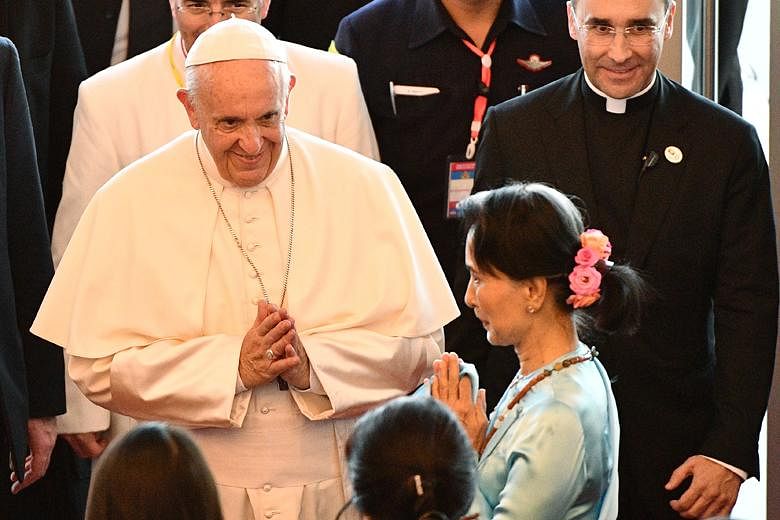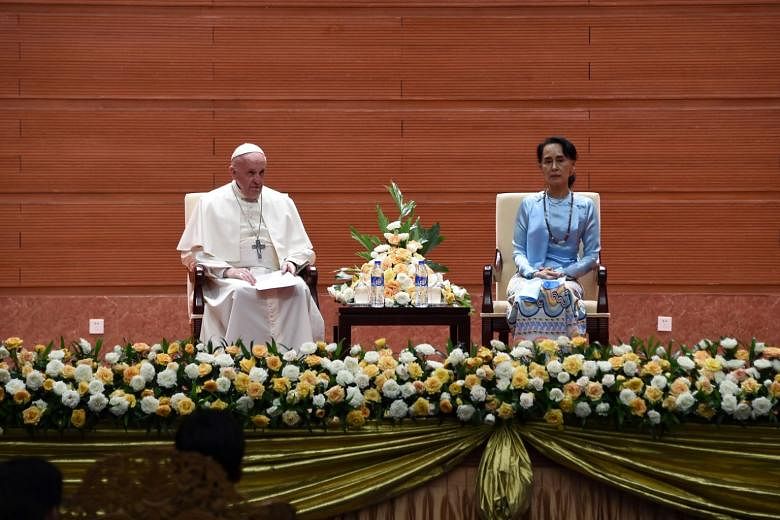BANGKOK - Pope Francis called for respect for each ethnic group and its identity in Myanmar, amid international scrutiny over the mass exodus caused by a military crackdown in its troubled western Rakhine state.
Speaking before officials and diplomats in Naypyitaw on Tuesday (Nov 28) after meeting Myanmar's de facto leader Aung San Suu Kyi, he said: "The future of Myanmar must be peace, a peace based on respect for the dignity and rights of each member of society, respect for each ethnic group and its identity, respect for the rule of law, and respect for a democratic order that enables each individual and every group - none excluded - to offer its legitimate contribution to the common good."
He did not, however, mention the Rohingya Muslims. Over 600,000 of them have fled from Rakhine state across the border to Bangladesh since August, driven by a scorched-earth campaign of the Myanmar military against Rohingya insurgents.
The military, or Tatmadaw as it is known locally, denies numerous reports by the United Nations and human rights groups that troops killed, tortured and raped Rohingya to drive them from their villages.
Within the country, the Rohingya are referred to as "Bengali" and generally draw little sympathy as they are seen as illegal migrants imported by the British while the country was under colonial rule. Many avoid using the word "Rohingya", lest it lends weight to the group's claim as a unique ethnic minority group.
Before his arrival, the Pope had been warned against uttering the word "Rohingya", in case it inflames tensions in Myanmar and turns public sentiment against the country's tiny Catholic minority. Just 6.2 per cent of Myanmar's population is Christian and about 1 per cent Catholic.
"Religious differences need not be a source of division and distrust, but rather a force for unity, forgiveness, tolerance and wise nation-building," the Pope said on Tuesday, according to the English translation of his remarks that were made in Italian.
"The religions can play a significant role in repairing the emotional, spiritual and psychological wounds of those who have suffered in the years of conflict."
Pope Francis, having spoken out for the plight of refugees, had pledged ahead of his arrival to Myanmar on Monday that he was visiting the nation "in a spirit of respect and encouragement for every effort to build harmony and cooperation in the service of the common good".

Myanmar's powerful commander-in-chief Min Aung Hlaing visited Pope Francis on Monday at the residence of the archbishop of Yangon, Cardinal Charles Bo. The senior general controls three key ministries and acts autonomously under a Constitution drafted before the country's transition from five decades of direct military rule to a civilian democracy.
After the meeting, a Facebook post from the military chief's office declared "Tatmadaw is making efforts to restore peace" and that "there is no religious discrimination in Myanmar as the country ensures religious freedom".
The Myanmar government is engaged in complex peace talks with ethnic armed groups, some of which are still fighting the Tatmadaw.
Earlier on Tuesday, Pope Francis met leaders of the Buddhist, Islamic, Hindu, Jewish and Christian faiths in Yangon, telling them "unity is always a product of diversity", according to Reuters report.
"Everyone has their values, their riches as well as their differences, as each religion has its riches, its traditions, its riches to share," he reportedly said. 'And this can only happen if we live in peace, and peace is constructed in a chorus of differences."
Last year, the Argentinian pontiff took 12 Syrian refugees back to Rome on his plane after visiting the Greek island of Lesbos, where thousands of people from the Middle East, Africa and Asia had landed after fleeing their homelands.
A message on his official Twitter account then said: "Refugees are not numbers, they are people who have faces, names, stories, and need to be treated as such."
And, in an address in August, he appealed for an end to the "persecution" of "our brother and sister Rohingya".
Some locals in Myanmar, meanwhile, have drawn pride in the Pope's visit. Yangon resident Tin Naing Tun, 30, who is a Buddhist, told The Straits Times: "The Pope has never been to Myanmar. He is visiting Myanmar now because our country is open and safe."
Peace advocates like Mr Kyaw Lin Oo, associate director of Yangon-based Centre for Peace and Reconciliation, were circumspect about what the pontiff could achieve on his visit.
He told ST: "I think the Pope can give friendly advice, but we also have our own (unique) situation… I also hope he can bring our messages from the government and the Tatmadaw to the world. That would be helpful."
The Pope will hold a public mass in Yangon on Wednesday and meet Myanmar's most senior Buddhist monks, before flying to Bangladesh on Thursday.




